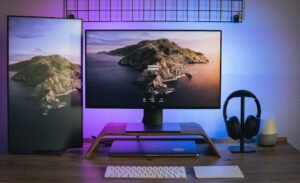How Is AI Used in Movies?
Artificial Intelligence (AI) has become an integral part of the movie-making process, revolutionizing various aspects from pre-production to post-production. In recent years, filmmakers have embraced AI technologies to enhance visual effects, improve storytelling techniques, and streamline production processes. This article explores the diverse applications of AI in the film industry and how it is shaping the future of cinema.
Key Takeaways:
- AI is revolutionizing the movie-making process, from pre-production to post-production.
- It enhances visual effects, improves storytelling techniques, and streamlines production processes.
- AI can generate realistic characters, predict box office success, and assist in video editing.
**One of the primary applications** of AI in movies is in generating **realistic characters**. Using cutting-edge technologies, AI can create virtual characters that look and behave like real people. This has been particularly useful for bringing deceased actors back to the big screen or creating fantastical creatures that interact seamlessly with human actors.
AI algorithms can also analyze vast amounts of data to **predict box office success**. By considering factors such as genre, cast, director, and historical box office performance, AI can provide insights into the potential commercial success of a movie. This helps film studios make informed decisions about which projects to fund and how to market them effectively.
**Another key area** where AI is used in movies is video editing. AI-powered video editing software can analyze hours of footage and automatically make suggestions for the best shots, transitions, and pacing. This not only saves time for editors but also enhances the overall quality of the final product, resulting in more engaging and visually appealing films.
AI has also found its way into **improving visual effects**. Traditionally, visual effects in movies required painstaking manual work, but AI has made this process more efficient. By automating certain tasks, such as rotoscoping or object removal, AI can speed up the production process and free up time for artists to focus on more creative aspects of visual effects.
AI in Movies: Interesting Facts and Data Points
| Movie | Year | AI Application |
|---|---|---|
| The Curious Case of Benjamin Button | 2008 | AI-generated ageing effects for Brad Pitt’s character |
| Ex Machina | 2014 | AI-powered humanoid robot as the main character |
| Blade Runner 2049 | 2017 | AI-generated character as a key antagonist |
**In addition**, AI has the potential to revolutionize **scriptwriting**. Using natural language processing and machine learning algorithms, AI can analyze scripts, identify patterns, and provide suggestions for dialogue, character development, and plot twists. While AI is not yet capable of creating a masterpiece on its own, it can assist writers in generating fresh ideas and improving storytelling techniques.
Moreover, AI has been used in **digital restoration** of old movies. By analyzing degraded film prints and applying advanced algorithms, AI can restore films to their former glory, enhancing image quality, reducing noise, and reviving colors. This ensures that classic movies can be preserved and enjoyed by future generations.
AI’s Impact on Movie Production
- Streamlining pre-production: AI algorithms can analyze massive amounts of data to help filmmakers make informed decisions about script selection, casting choices, and location scouting. This saves time and resources by eliminating guesswork and increasing the chances of a successful film.
- Optimizing marketing strategies: By analyzing audience data, AI can predict which marketing campaigns will be the most effective for promoting a movie. This allows studios to target their efforts where they are most likely to generate buzz and ticket sales.
- Enhancing post-production: AI-powered editing tools can automate certain tasks, such as color grading or sound mixing, improving the overall efficiency of post-production and ensuring a high quality final product.
Conclusion
In conclusion, AI is transforming the movie industry in profound ways. **From generating realistic characters** to predicting box office success, AI technologies have the potential to revolutionize the way films are made and enjoyed. As technology continues to advance, AI will undoubtedly play an even greater role in shaping the future of cinema.

Common Misconceptions
AI Creates Entire Movies
One common misconception about AI in movies is that it single-handedly creates entire films. While AI can definitely aid in certain aspects of movie production such as generating visual effects or enhancing post-production processes, it does not replace the human creativity and decision-making needed to produce a complete film.
- AI assists in generating visual effects, not creating full movies independently.
- Human involvement is still crucial in the creative decisions and storytelling process.
- AI can streamline certain post-production tasks, but it cannot fully replace human editors and directors.
AI Fully Controls Actors’ Movements
Another misconception is that AI technology is responsible for controlling actors’ movements on screen. While motion capture technology utilizes sensors and cameras to record actors’ movements for later digital manipulation, the actual performance and emotions portrayed by the actors on screen are entirely their own.
- AI technology records actors’ movements but does not control them in real-time.
- Actors’ performances are what create the emotional impact in movies, not AI algorithms.
- Motion capture technology only serves as a tool for animators and filmmakers to enhance and create visual effects.
AI Replaces the Need for Writers
A commonly misunderstood concept is that AI can replace the need for human writers when developing movie scripts. While AI can be used to analyze data, generate ideas, and assist in scriptwriting, it lacks the innate creativity, depth, and understanding of human emotions that writers bring to the table.
- AI can analyze data to identify trends or patterns, but it cannot replace the imaginative thinking of human writers.
- The human touch and understanding of emotions are crucial elements that AI lacks when generating scripts.
- AI can support and provide ideas, but human writers are still essential for creating well-crafted and compelling stories.
AI Always Appears as a Humanoid Robot
It is a misconception that AI in movies always appears as a humanoid robot with human-like features. While humanoid AI robots are frequently portrayed in films, AI technology goes far beyond physical appearances and can be represented through various forms, such as voice assistants, intelligent systems, or algorithms.
- AI can manifest as voice assistants like Siri, Alexa, or Google Assistant.
- Visual representations of AI can range from advanced humanoid robots to simple computer interfaces.
- AI is not limited to physical form; it encompasses intelligent systems and algorithms that power various technologies in movies.
AI Can Replace Actors in Movies
Lastly, it is important to debunk the misconception that AI has the ability to completely replace human actors in movies. While AI technology can be used to generate realistic human-like characters or create digital doubles, the artistry, emotional depth, and interpretation that actors bring to their roles cannot be replicated by AI.
- AI can generate digital characters, but it cannot replicate the nuanced performances of human actors.
- Actors’ unique abilities to convey emotions and create authentic connections with the audience cannot be matched by AI technology.
- The collaboration between AI and actors can enhance certain aspects of filmmaking, but actors remain an indispensable component in bringing stories to life.

AI Applications in Movies
Artificial Intelligence (AI) has made significant advancements in the film industry, revolutionizing the way movies are made and enjoyed. From creating lifelike characters to enhancing special effects, AI has become an integral part of the filmmaking process. The following tables provide a glimpse into the fascinating ways AI is utilized in movies.
AI-generated Characters in Movies
The film industry has embraced AI technologies to bring fictional characters to life. Through the use of deep learning algorithms and machine learning techniques, AI can generate incredibly realistic characters that captivate audiences.
Box Office Performance of AI-themed Movies
The influence of AI extends beyond the production process, as filmmakers have recognized the audience’s interest in AI-related themes. This table highlights some popular AI-themed movies and their respective box office performances.
AI-assisted Special Effects
Special effects play a crucial role in creating awe-inspiring visuals on the big screen. AI has brought significant advancements in this area by automating certain aspects of the visual effects production pipeline.
AI Contribution to Film Screenwriting
Screenwriters can now leverage AI tools to assist in the creative process, helping generate ideas, dialogue, and plotlines. This table provides examples of movies where AI had a hand in the screenwriting process.
Impact of AI on Film Editing
Editing is a crucial element in shaping the final narrative of a film. AI-powered editing tools allow for efficient and innovative post-production processes, enabling filmmakers to produce captivating cinematic experiences.
AI-enhanced Movie Recommendations
AI algorithms are used to analyze viewers’ preferences and provide personalized movie recommendations. This table showcases how AI enhances the movie-watching experience by suggesting films tailored to individual tastes.
Top AI-Driven Movies of All Time
Some movies have had a profound impact on popular culture by exploring thought-provoking AI-related concepts. This table highlights a selection of the most memorable and influential AI-driven films to date.
Types of AI Technology Used in Visual Effects
AI technologies are instrumental in bringing stunning visual effects to the silver screen. This table breaks down different types of AI technology employed in the realm of visual effects.
AI in Film Marketing and Audience Engagement
The application of AI in film marketing campaigns and audience engagement has revolutionized the way movies are promoted and experienced by viewers. This table showcases some innovative uses of AI in this realm.
AI in Movie Sound Design
AI is also making its mark in the realm of sound design, transforming the way movies sound to enhance the overall cinematic experience. This table highlights some movies that have employed AI in their sound design processes.
In conclusion, AI has become an invaluable tool in the film industry, driving innovation, creativity, and engagement. Whether it’s through generating lifelike characters, improving special effects, or enhancing the overall cinematic experience, AI has cemented its place in modern filmmaking. With further advancements, we can expect AI to continue pushing the boundaries of what is possible in the world of movies.
Frequently Asked Questions
How Is AI Used in Movies?
What is artificial intelligence (AI)?
How is AI used in movies?
Which movies have prominently featured AI characters?
Can AI create movies on its own?
Do filmmakers use AI to improve storytelling?
What impact does AI have on visual effects in movies?
Can AI replace human actors in movies?
Are there any ethical concerns regarding AI in the movie industry?
How can AI improve the movie-watching experience?
What does the future hold for AI in the movie industry?




